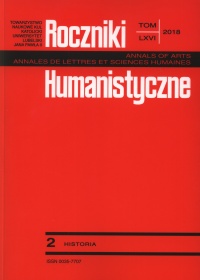The Ideal of the Chivalric Ethos in Libro del orden de caballería of Ramon Llull
Abstract
The article presents the figure of Ramon Llull (1232-1316), a Catalonian theologian, philosopher and a Secular Franciscan. It also aims at the analysis of his work Libro del orden de caballería (created between 1274 and 1276). The article describes the process of creation and gradual development of the knight ideals, which are also called the chivalric ethos. The main reason behind the creation of the knight ideals was the involvement of the chivalry from Western Europe in the fight with the infidels in the Holy Land and the Reconquista. Llull, similarly to other medieval authors who write about the chivalry, underlines the moral aspect rather than the military one. According to the Spanish theologian, the concern about the spiritual condition of a knight comes to the fore, because it has an effect on the functioning of the entire knighthood.
References
Barber R.W., The Knight and Chivalry, Woodbridge: Scribner 1995.
Barber R., Rycerze i rycerskość, tłum. J. Kozłowski, Warszawa: Bellona 2003.
Barber R., The Reign of Chivalry, New York: St. Martin’s Press 2005.
Boysel N.A., Bernard of Clairvaux and the Knights Templar: The New Knighthood as a Solution to Violence in Christianity, Akron: University of Akron 2009.
Johnston M., Literacy, Spiritual Allegory and Power: Llull’s Libre de l’orde de cavalleria, „Catalan Review” (Barcelona) 4(1990), Núm. 1-2, s. 357-376.
Josserand Ph., Eglise et pouvoir dans la Péninsule ibérique: les ordres militaires dans le royaume de Castille, 1252-1369, Madrid: Casa de Velázquez 2004.
Hryszko R., Działalność Rajmunda Llulla w Afryce Północnej (XIII i XIV wiek). Początki dialogu chrześcijańsko-muzułmańskiego, „Nurt SVD” 2 (2015), s. 56-85.
Kaeuper R., Chivalry and Violence in Medieval Europe, Oxford: Oxford University Press 1999.
Keen M., Chivalry, New Haven: Yale University Press 1984.
Keen M., Rycerstwo, przeł. A. Bugaj, Warszawa: PIW 2014.
Komarnicki K.F., Etos mnicha wojownika w kontekście teologii wojny na podstawie Reguły Templariuszy i Pochwały Nowego Rycerstwa św. Bernarda z Clairvaux, „Rocznik Teologii Katolickiej” 12(2), 2013, s. 197-218.
Michalski B., Ramon Llull i klasztor Miramar, „Perspectiva – Studia Teologiczno-Historyczne” 15(2016), nr 1 (28), s. 187-198.
Miotk A., Rajmund Lull jako prekursor metody dialogu w misyjnej działalności kościoła katolickiego w średniowieczu, „Studia Warmińskie” 41-42(2004-2005), s. 97-112.
Peters E., The First Crusade: The Chronicle of Fulcher of Chartres and Other Source Material, Phila- delphia: University of Pennsylvania Press 1971.
Piña Homs R., Alfonso el Sabio y Ramón Llull: su concepción de la justicia y del orden social, Palma de Mallorca: UP 1984.
Prestage E., Chivalry, New York: AMS Press 2013.
Sanchis Guarner M., L’ideal cavalleresc definit per Ramon Llull, „Estudios Lulianos” 2(1958), fasc. 1, s. 37-62.
Taylor C., Chivalry and the Ideals of Knighthood in France During the Hundred Years War, Cambridge: University of Cambridge 2013.
Temple House R., L’Ordene de Chevalerie, an old French Poem, Chicago: University of Chicago Libraries 1918.
Copyright (c) 2018 Roczniki Humanistyczne

This work is licensed under a Creative Commons Attribution-NonCommercial-NoDerivatives 4.0 International License.





